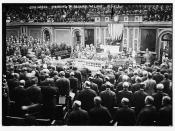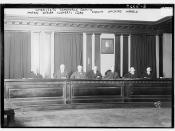The Gibbons v. Ogden case was also known as the "steamboat case" in 1824. It occurred when New York tried to grant a private concern on a monopoly of waterborne commerce between New York and New Jersey. Chief Court Justice John Marshall reminded them that the Constitution stated that Congress alone controlled interstate commerce. This case was a turning point for the expansion of federal power to address the national problems. Aaron Ogden competed with Thomas Gibbons in running their steamboat business. They both claimed the waterway between New York and New Jersey was their area of business. Both held two different licenses from the government that granted the same privileges. The state courts ruled out in favor of Ogden and demanded for Gibbons to stop operating his boats in that area. When brought to the Supreme Court, Marshall reversed the decision and granted that the Congress, not the states, have the power to regulate interstate commerce.
Ultimately Gibbons won the case.
In 1808, Robert Fulton and Robert Livingston acquired a monopoly from the New York State legislature to operate steamboats of the state's waters. This monopoly expands to the waterways between the states or the "interstate waterways". Aaron Ogden held a Fulton-Livingston license to operate his steamboat company between New Jersey and New York under this monopoly. Thomas Gibbons held a license that granted a similar privilege but it was federal coasting license, granted under a 1793 act of Congress. This meant that the State government conflicted with the National government in this case of interstate commerce.
Gibbons argued that the United States Constitution gave the national government, the Congress, the only power over interstate commerce. The Constitution states that Congress has the power "to regulate commerce with foreign Nations, and among the several States." He stated that if...


